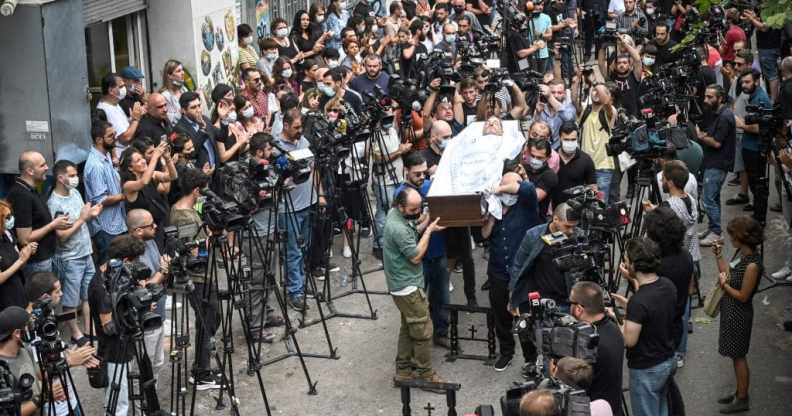Funeral for Georgian cameraman who died after far-right attack prompts outpouring of grief and fury

Media flank the path of mourners following the coffin with the body of Alexander Lashkarava, 37, in Tbilisi on July 13, 2021. (VANO SHLAMOV/AFP via Getty)
Camera operators in Tbilisi, Georgia lined the streets and pointed their cameras at the ground in a mark of respect for Alexander Lashkarava, the cameraman who died after being beaten by an anti-LGBT+ mob.
Lashkarava was found dead in his bed on Sunday (11 July), just six days after he was mercilessly beaten by the far-right mob that seized the city in protest against a planned Pride march.
Fellow journalists took to the streets of Georgia on Tuesday (13 July), the day of his funeral, to show their respect for the deceased cameraman.
Powerful video footage shared on social media shows members of Georgia’s media paying their respects to the cameraman, whose death has been blamed on the government by activist groups.
Journalists form a corridor for their colleague & friend Lekso Lashkarava’s funeral (video credits to Zaza Shukvani) pic.twitter.com/Ek028eWlI3
— Helen Khoshtaria (@Helenkhosh) July 13, 2021
Journalists erupted into applause as his coffin was carried through the crowds ahead of his funeral.
Georgia’s government accused of ‘stifling’ the press at Alexander Lashkarava’s funeral
Speaking at Lashkarava’s funeral, which was televised, TV Pirveli journalist Eka Michveladze accused the government of trying to “stifle the independent press”.
Vakho Sanaia, a Formula TV reporter, added: “We are mourning the death of a colleague today, but tomorrow everyone will know the strength of our independent media.”
Four independent television stations went dark on Wednesday in protest against Lashkarava’s death. Each station posted identical statements on social media demanding prime minister Irakli Garibashvili resign
Georgia’s government has faced strident backlash from human rights groups over its failure to take action against far-right and religious mobs, both of which unleashed violence on the city in response to a planned Pride march.
More than 50 journalists who were covering the Pride event were assaulted, with activist groups accusing the police and the government of doing nothing to stop the escalation of violence.
Garibashvili has been heavily criticised for appearing to pin the blame for violence on the country’s LGBT+ community, suggesting they shouldn’t have tried to hold a Pride march in the first place.
Public outcry reached a fever pitch on Sunday (11 July) after Lashkarava was found dead. He had been violently assaulted just days earlier while covering the anti-Pride demonstrations for TV Pirveli.
Protesters have gathered both in and outside Georgia’s parliament calling for Garibashvili to resign over his death.
#Georgia: 100s of journalists gathered today to honour @TvPirveli cameraman A. Lashkarava, who died 6 days after being beaten by far-right assailants. @RSF_inter calls on @GovernmentGeo for an in-depth, impartial and transparent official investigation. https://t.co/EmMQNPkSP0 pic.twitter.com/MCJ4nTcQ5N— RSF in English (@RSF_en) July 13, 2021
Public backlash intensified again when police forcibly took Lashkarava’s body from his family for a state-led autopsy. His family has said they don’t trust the government.
The Ministry of Internal Affairs subsequently claimed they found a number of drugs in Lashkarava’s system.
Jeanne Cavalier, head of Reporters Without Borders‘ Eastern European and Central Asia Desk, said the attack on journalists in Tbilisi was part of a “coordinated attack”, adding that it marked “a disastrous turning point for the freedom to inform in Georgia”.
“Instead of trying to discredit the late cameraman, we demand that the Interior Ministry launch an in-depth, impartial and transparent investigation of the circumstances of this death and of the attacks suffered by journalists whom the police failed to protect,” Cavalier said in a statement.
“Officials’ passivity in the face of this extreme attempt at intimidation of journalists by homophobic movements erodes the credibility of the government, which should not tolerate impunity, and which must accept its share of responsibility in the matter.”

